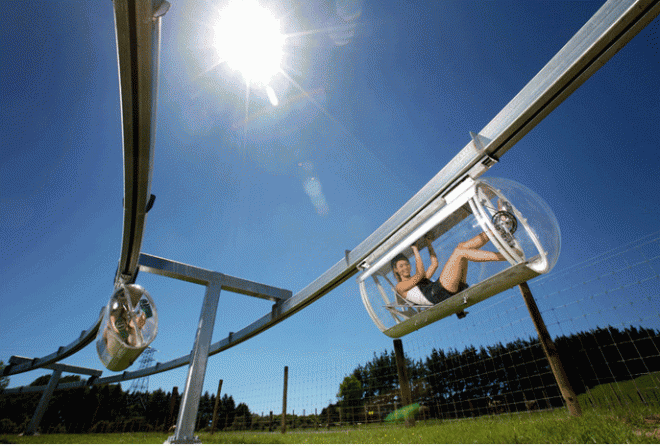Bicycle teaming with monorail

It is a pity only in the future.
Two years ago, Google launched the “ 10 to 100 Degrees ” project, under which it promised to finance ideas that will change the world. 150,000 applications were sent to the competition, and last week Google announced the list of five winners.
It included a company called Shweeb , which proposed the construction of monorails, equipped with small personalized capsules, the movement of which is provided by a person inside with the help of pedals of a recumbent bicycle. Google gives the company $ 1 million for research and development of "tests of Shweeb technology in an urban setting."
Simply put, Google considers the other 149,996 offers unworthy of funding. The monorail definitely looks cool in an amusement park, such as Disneyland, and recumbent bicycles, not intended for everyday city driving. But only the worst science fiction writer could combine these two things.
Can you imagine how sweaty and smelly these booths will be? If I have to pedal in order to get somewhere, why not use an ordinary bicycle, which is intended for this? In addition, they will certainly be very slow, and will require a large staff, like in amusement parks, so that people can safely move with their help.
')
Shweeb is going to announce where the first public transit system will be installed. Surely it would look good in Miami Beach, where tanned people could move with their help from the hotel to the beach in bathing suits, showing off their liposuction and collagen injections through a plexiglass glass capsule. Perhaps this would be useful in Portland, Oregon, where with its help bearded programmers could move from one beer to another. Or perhaps replace the miniature and defiantly painted bicycles on which Goggle engineers move around the campus in Mountain View. We'll see.
However, other contest winners look more worthy.
The most recognized online fighter for transparency and openness of the government, Karl Malamud, will receive $ 2 million for his project law.gov , in order to make national legal materials available for free to anyone on the Internet.
Khan Academy , a non-profit educational organization that “will provide high-quality, free education for anyone, no matter where it comes from, with the help of an online library of more than 1,600 educational videos,” will also receive 2 million. This will help increase the number of courses presented and translate them into various languages.
FIRST , a non-profit organization that organizes team competitions to promote science and technology, will receive $ 3 million to promote student teams developing controlled robots.
The African Institute of Mathematical Sciences (AIMS), which launched the one-year program, to help graduates prepare for graduate school and defend their Ph.D. Google gives it $ 2 million to popularize the science of university graduates in Africa.
All these applicants have proposed great initiatives. And how will Shweeb look on their background? Time will tell.
via Wired
Source: https://habr.com/ru/post/105209/
All Articles